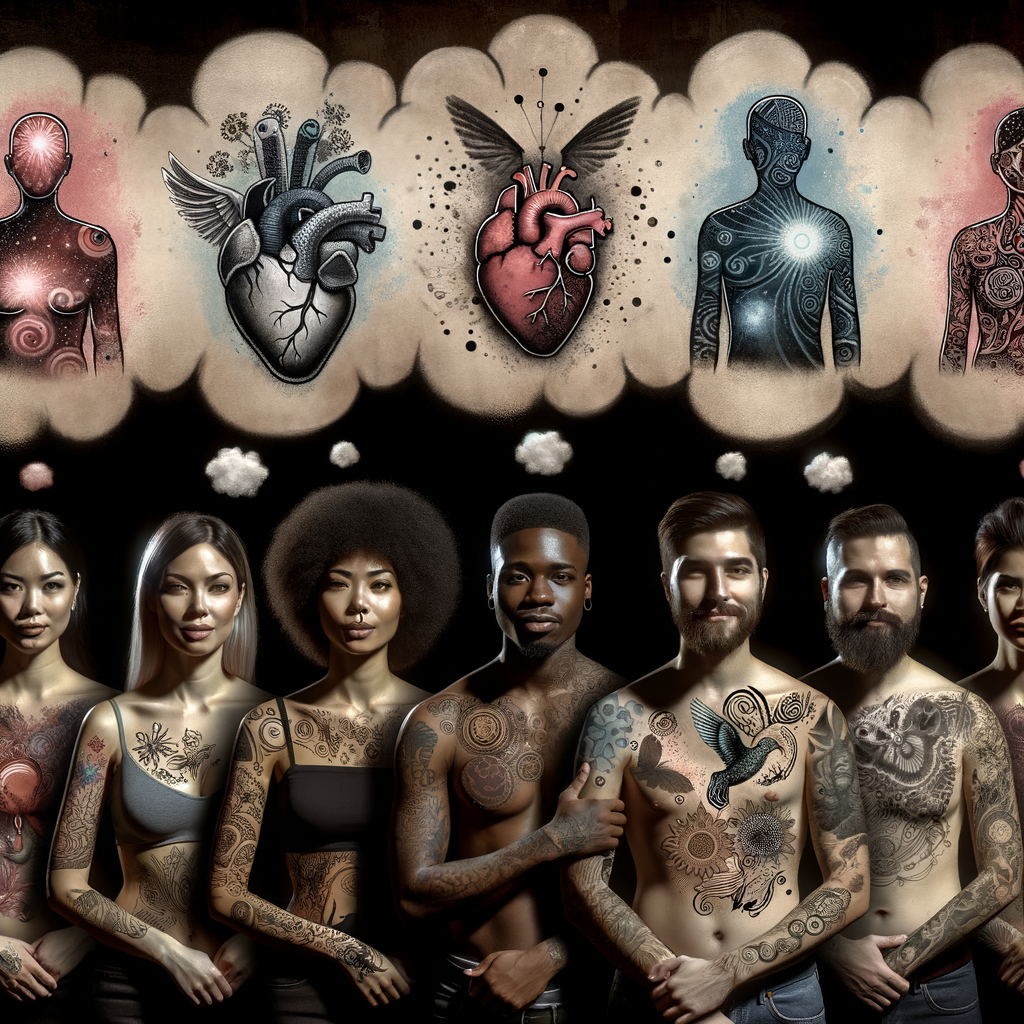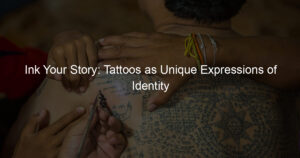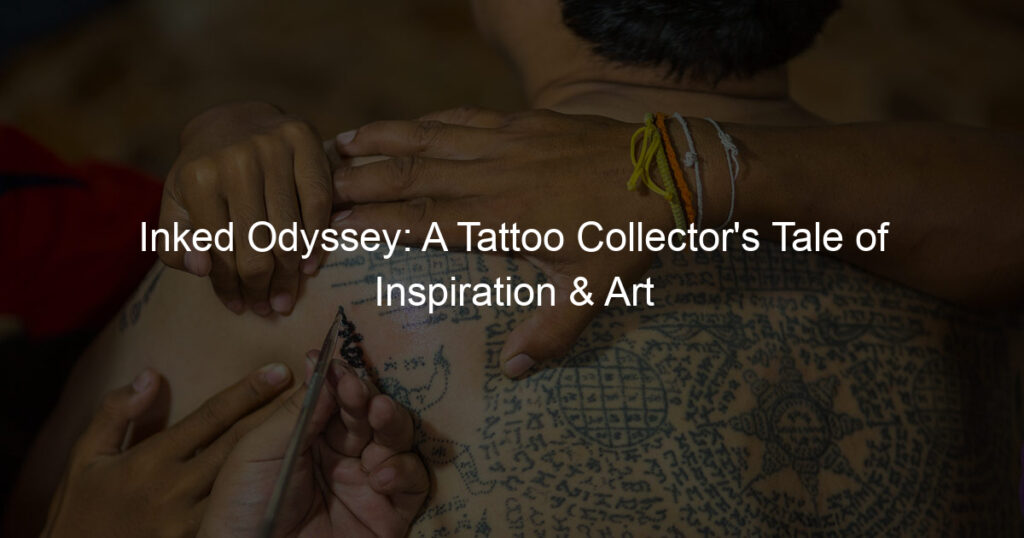
Introduction to the Psychology Behind Tattoos
When we think about tattoos, we often focus on the design, the colors, and the artist’s skill. However, there is a deeper layer to tattoos that often goes unnoticed – the psychology behind them. This article will delve into the fascinating world of tattoo psychology, exploring why people get tattoos and what they can reveal about a person’s inner world.
Tattoos have been a part of human culture for thousands of years, serving various purposes from tribal markings to fashion statements. Today, they are more popular than ever, with nearly 30% of Americans having at least one tattoo. But what drives people to permanently mark their bodies with ink? The answer lies in the realm of psychology. The reasons for getting a tattoo are as diverse as the designs themselves, ranging from self-expression and identity formation to coping with trauma and creating a sense of belonging.
Understanding the psychology behind tattoos can provide valuable insights into human behavior and emotions. It can help us comprehend why people choose to express themselves in such a permanent way and what these symbols mean to them. Moreover, it can assist professionals in fields like psychology, sociology, and anthropology in their research and practice. For instance, therapists can use this knowledge to better understand their clients and provide more effective treatment. In a broader sense, understanding tattoo psychology can foster empathy and acceptance in society by helping us appreciate the diverse ways in which people express their identities and experiences.
In the following sections, we will delve deeper into the historical context of tattoos, the psychological reasons behind them, their role in identity formation and self-expression, and the meanings they can hold. So, let’s embark on this fascinating journey into the world of tattoo psychology.
Historical Context of Tattoos
Let’s take a journey back in time to understand the fascinating history of tattoos. Tattoos have been a part of human culture for thousands of years, with their origins and meanings evolving over time.
-
- Origins of Tattoos
The earliest evidence of tattoos dates back to the ancient Egyptians around 2000 BC. However, the oldest known tattooed human skin to date is found on the body of Ötzi the Iceman, who lived between 3370 and 3100 BC. Tattoos were used for various purposes such as religious rituals, status symbols, or even as a form of medicine.
-
- Evolution of Tattoo Meanings
Over time, the meanings behind tattoos have significantly evolved. In ancient times, tattoos often symbolized bravery, fertility, or spiritual beliefs. As societies changed, so did the interpretations of tattoos. In some cultures, they became associated with criminality and rebellion. However, in the modern world, tattoos have regained their ancient status as art forms and expressions of individuality.
Understanding the historical context of tattoos helps us appreciate their significance in today’s society. They are not just fashion trends, but a form of self-expression with deep historical roots.
| Time Period | Significance of Tattoos |
|---|---|
| Ancient Times | Religious rituals, status symbols, medicine |
| Middle Ages | Mark of criminality or rebellion |
| Modern Times | Art forms, expressions of individuality |
Understanding Tattoos: The Psychological Reasons
There are many reasons why people choose to get tattoos. It’s not just about the art or the trend; it’s often about something deeper. Let’s delve into some of the psychological reasons behind getting inked.
Reasons for Getting Tattoos
Here are some of the main reasons why individuals decide to get tattoos:
-
- Self-expression
Tattoos are a form of self-expression. They allow individuals to convey their thoughts, beliefs, and experiences in a unique and personal way. For instance, a person might get a tattoo of a lion to symbolize their courage or a rose to represent love.
-
- Identity formation
Tattoos can play a significant role in identity formation. They can serve as a reminder of who a person is, where they come from, or what they aspire to be. A tattoo might represent a person’s cultural heritage, personal philosophy, or a significant life event that shaped their identity.
-
- Memorialization
Many people get tattoos to memorialize a loved one or commemorate a significant event in their lives. These tattoos serve as a permanent reminder of the person or event, helping the individual to keep their memories alive.
In conclusion, tattoos are not just about aesthetics. They are deeply personal and often have significant psychological implications. Whether it’s for self-expression, identity formation, or memorialization, each tattoo tells a unique story about the person who wears it.
Emotional Significance of Tattoos
While tattoos are often seen as a form of self-expression or a way to commemorate significant events or people, they also hold deep emotional significance for many individuals. They can serve as a source of therapeutic benefits and emotional healing. Let’s delve into these aspects.
- Therapeutic Benefits
Tattoos can provide therapeutic benefits in several ways. For some, the process of getting a tattoo can be a form of catharsis, allowing them to release pent-up emotions or stress. The physical pain experienced during the tattooing process can sometimes serve as a distraction from emotional pain, providing a temporary relief.
Moreover, tattoos can serve as a constant reminder of personal growth or a significant life event. For instance, many cancer survivors get tattoos to mark the end of their treatment and the beginning of a new chapter in their life. This can provide a sense of closure and a feeling of accomplishment that aids in their emotional recovery.
- Emotional Healing
Emotional healing is another significant aspect of tattoos. Tattoos can serve as a tangible reminder of overcoming hardship, providing a sense of empowerment and resilience. They can also be a way to honor a loved one who has passed away, helping individuals cope with their grief and loss.
Furthermore, tattoos can also help individuals reclaim control over their bodies after experiences such as trauma or illness. For instance, some individuals choose to get tattoos to cover scars from accidents or surgeries, helping them feel more confident and comfortable in their own skin.
In conclusion, the emotional significance of tattoos extends far beyond their visual appeal. They can serve as a powerful tool for emotional healing and therapy, providing individuals with a sense of empowerment, resilience, and control over their own bodies.
Tattoos and Identity
One of the most fascinating aspects of tattoos is their ability to express an individual’s identity. This section will explore how tattoos contribute to personal identity and provide a case study on the role of tattoos in different cultures.
- How tattoos contribute to personal identity
Tattoos are more than just ink on skin. They are a form of self-expression, a way to tell a story, and a reflection of one’s personality and beliefs. A tattoo can represent a significant event, a loved one, or a personal mantra. It can be a symbol of strength, resilience, or a cherished memory.
For example, a person might get a tattoo of a butterfly to symbolize their transformation and growth. Another might choose a lion to represent their courage and strength. The possibilities are endless, and each tattoo is as unique as the person wearing it.
By choosing to get a tattoo, individuals are making a statement about who they are. They are choosing to wear their identity on their skin, for the world to see. This is why tattoos can be such a powerful part of personal identity.
- Case study: Tattoos in different cultures
Tattoos have been a part of human culture for thousands of years, and their meanings can vary greatly from one culture to another. Let’s take a look at two different cultures and how they use tattoos to express identity.
| Culture | Significance of Tattoos |
|---|---|
| Maori (New Zealand) | For the Maori people, tattoos or ‘Ta Moko’ are a rite of passage and a sign of social status. They tell the story of a person’s ancestry and achievements. |
| Yakuza (Japan) | In Japan, tattoos are often associated with the Yakuza, the Japanese mafia. These tattoos, known as ‘Irezumi’, cover large areas of the body and often feature intricate designs of nature and mythology. |
As we can see, tattoos can hold deep cultural significance and are a powerful way for individuals to express their identity. Whether it’s a personal symbol of growth or a traditional design passed down through generations, tattoos are a unique and meaningful form of self-expression.
Tattoos as a Form of Self-Expression
Tattoos have been used as a form of self-expression for centuries. They are a way for individuals to showcase their personality, beliefs, and experiences in a visible and permanent way. As we delve into this topic, we will explore how tattoos serve as an artistic expression and take a look at some famous tattoo artists and their work.
-
- Artistic expression through tattoos
Art is a powerful form of self-expression, and tattoos are no exception. They allow individuals to wear their heart on their sleeve, quite literally. From intricate designs to simple symbols, each tattoo tells a story. It’s a way for people to express their individuality and creativity. Some people choose designs that hold personal significance, while others opt for artwork that they find aesthetically pleasing. Regardless of the reason, each tattoo is a unique piece of art that reflects the person who wears it.
-
- Case study: Famous tattoo artists and their work
There are many talented tattoo artists who have made a name for themselves in the industry. Let’s take a look at a couple of them:
| Artist | Known For |
|---|---|
| Kat Von D | Her detailed portraits and intricate designs. |
| Sailor Jerry | His bold, colorful, and iconic nautical-themed tattoos. |
These artists, among many others, have used their skills to create stunning pieces of art that are proudly worn by people all over the world. Their work showcases the limitless possibilities of tattoos as a form of self-expression.
In conclusion, tattoos are a powerful form of self-expression. They allow individuals to share their stories, beliefs, and personality in a visible and permanent way. Whether it’s a simple symbol or an intricate design, each tattoo is a unique piece of art that reflects the person who wears it.
The Meaning of Tattoos: A Deeper Dive
As we delve deeper into the world of tattoos, it’s essential to understand the symbolism behind them. Tattoos are more than just ink on skin; they often carry profound meanings and stories. Let’s explore this fascinating aspect further.
Symbolism in Tattoos
Symbolism plays a significant role in tattoos. It’s like a secret language that allows people to express their thoughts, beliefs, and experiences in a unique and personal way. Let’s take a closer look at some common symbols and how individuals personalize these symbols in their tattoos.
- Common symbols and their meanings
There are countless symbols used in tattoos, each with its own meaning. For instance, a rose often symbolizes love and beauty, while a lion can represent courage and strength. The butterfly, a popular tattoo choice, is seen as a symbol of transformation and rebirth. These are just a few examples; the list is endless.
- Personalized symbols in tattoos
While there are common symbols, many people choose to personalize these symbols to make their tattoos unique. For example, someone might choose a rose tattoo not just for its common symbolism of love, but because it reminds them of a loved one who adored roses. In this way, the same symbol can have different meanings for different people, adding a personal touch to their tattoos.
Understanding the symbolism in tattoos can help us appreciate the depth and complexity of this art form. Whether it’s a common symbol or a personalized one, each tattoo tells a story that’s as unique as the person wearing it.
Color Psychology in Tattoos
Color plays a significant role in the world of tattoos, each hue carrying its own unique symbolism and psychological impact. Let’s delve into the fascinating realm of color psychology in tattoos.
- Meaning of Different Colors in Tattoos
Each color used in a tattoo can represent different emotions, ideas, or values. Here are some common colors and their associated meanings:
| Color | Meaning |
|---|---|
| Red | Passion, love, anger, danger |
| Blue | Peace, calm, stability, trust |
| Green | Growth, renewal, health, environment |
| Black | Power, elegance, mystery, death |
| White | Purity, innocence, simplicity |
Remember, these meanings can vary depending on the culture and personal beliefs of the individual.
- Impact of Color Choice on Tattoo Perception
The color choice in a tattoo can significantly influence how it is perceived by others. For instance, a tattoo with vibrant colors might be seen as lively and expressive, while a black and white tattoo might be viewed as more serious and profound.
Moreover, the color of a tattoo can also impact its visibility and longevity. Bright colors like red and yellow are more noticeable but may fade faster over time. On the other hand, darker colors like black and blue tend to retain their vibrancy longer.
Ultimately, the choice of color in a tattoo is a deeply personal decision that can reflect one’s personality, values, and life experiences.
Conclusion: Why People Get Tattoos
In this article, we have explored the psychology behind tattoos, delving into the historical context, the reasons people get tattoos, and how tattoos serve as a form of self-expression and identity. Now, let’s summarize the key takeaways and share some final thoughts on the psychology behind tattoos.
-
- Summary of Key Takeaways
Tattoos have been a part of human culture for thousands of years, serving various purposes from marking social status to expressing personal beliefs. In modern times, tattoos have become a popular form of self-expression and identity. The reasons people get tattoos are diverse and complex, often tied to their personal experiences, emotions, and values. Some people get tattoos to commemorate significant events or people, while others use them as a form of self-expression or to convey their unique identity.
-
- Final Thoughts on The Psychology Behind Tattoos
The psychology behind tattoos is a fascinating field of study. It reveals how deeply personal and meaningful a tattoo can be for the person who wears it. While the reasons for getting a tattoo may vary, they often reflect a person’s inner world and life experiences. This makes tattoos more than just body art; they are a window into a person’s soul, telling stories that words sometimes cannot.
In conclusion, tattoos are a complex phenomenon, deeply rooted in human psychology and culture. They are a form of self-expression, a marker of identity, and a way to commemorate significant events or people. Understanding the psychology behind tattoos gives us a deeper insight into the human condition and the diverse ways in which we express our individuality.














